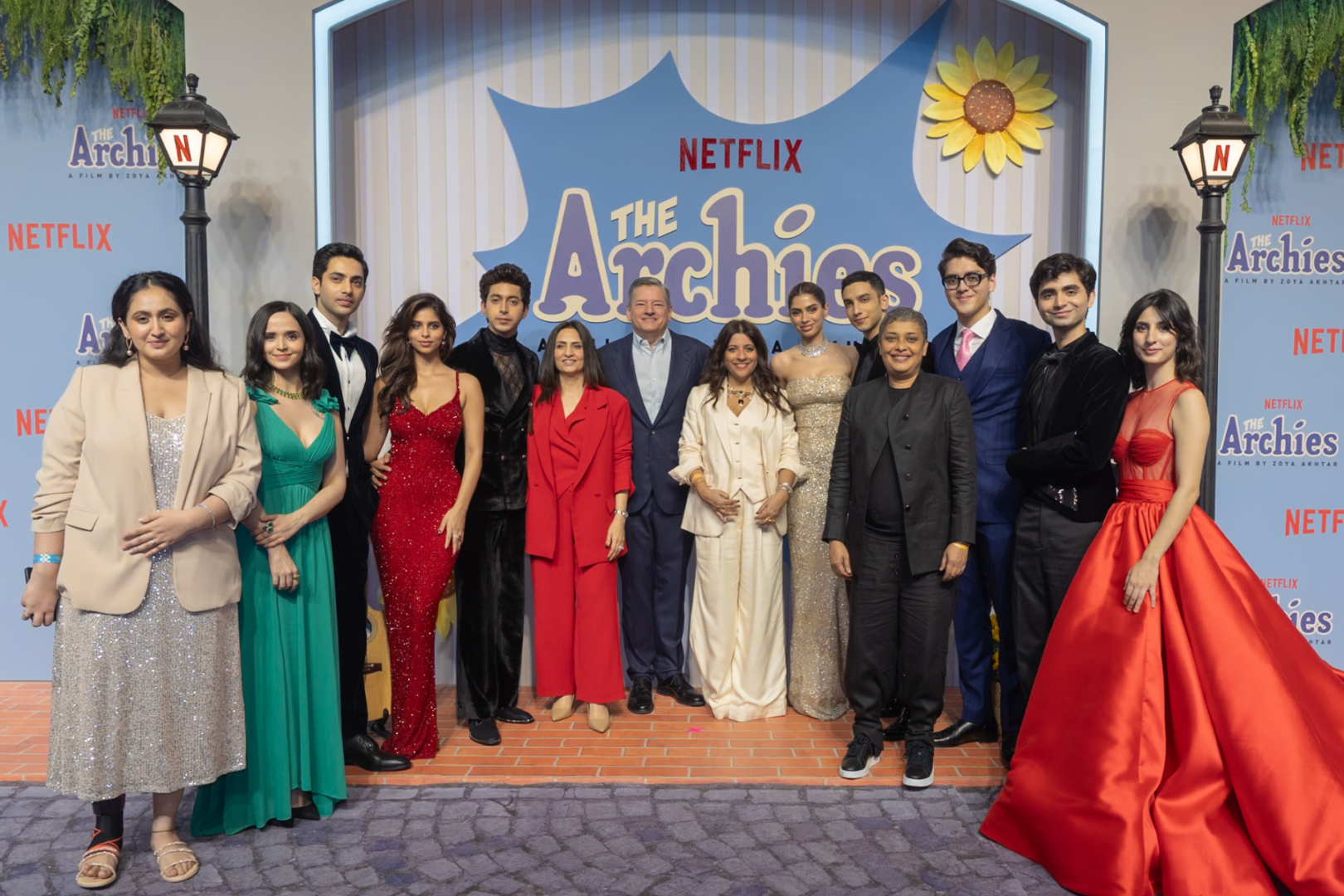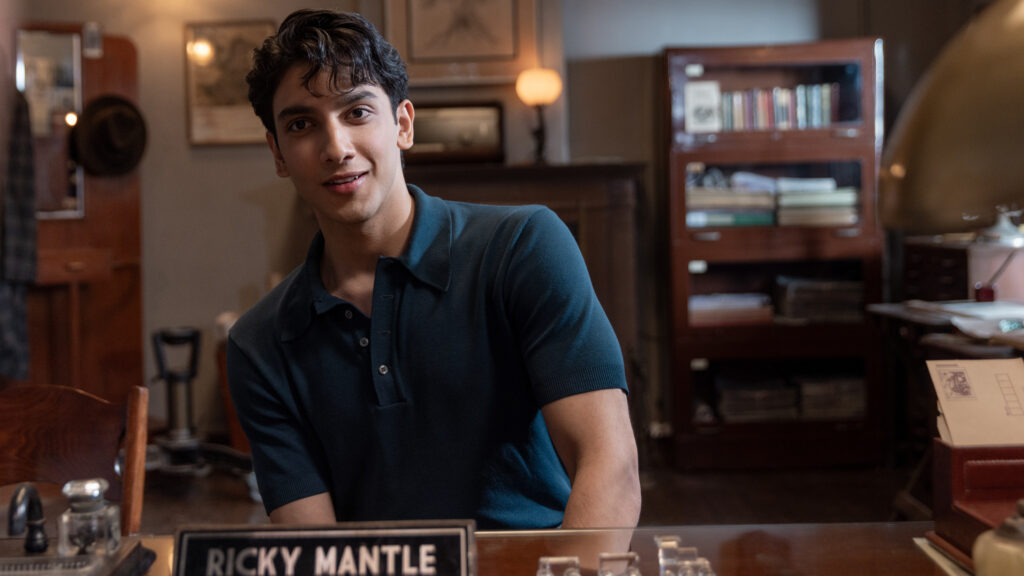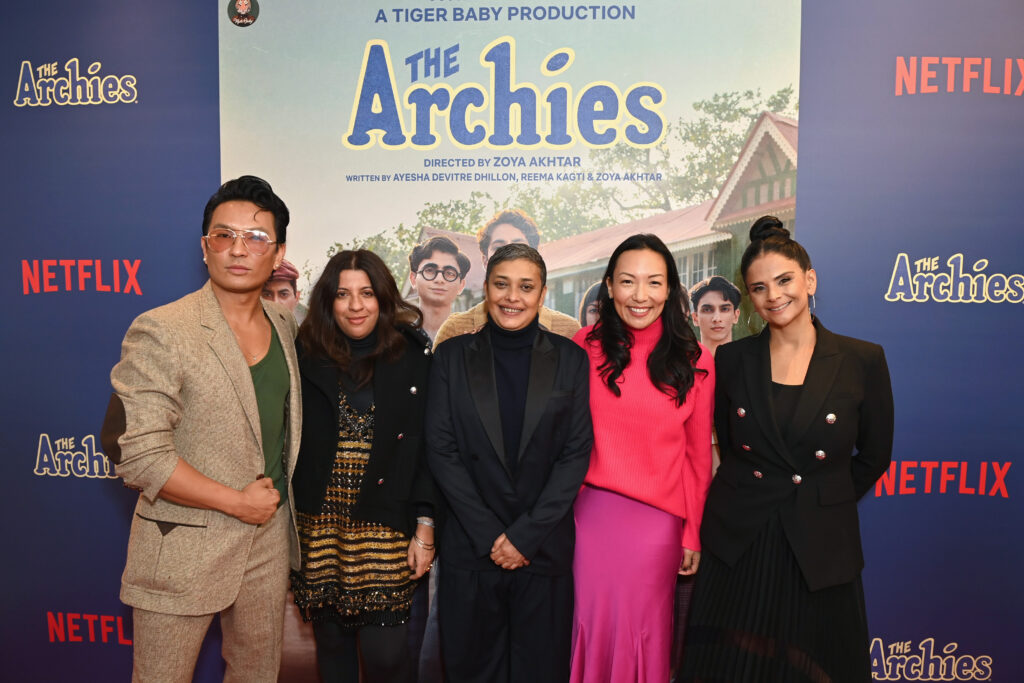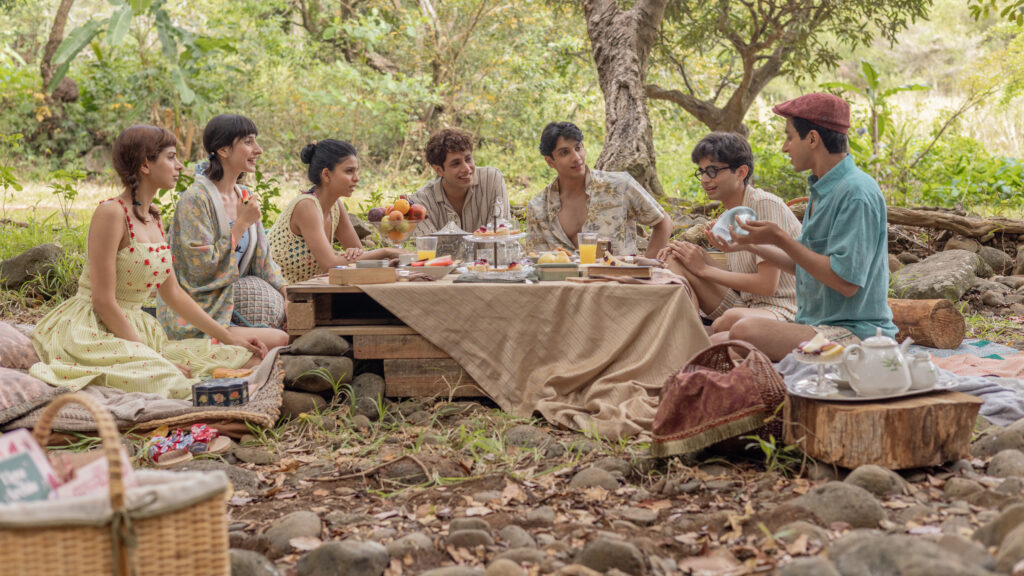
Around 80 years since the first issue came out and still strong in the conscious minds of those who grew up in the ’70s, ’80s, and the early ’90s — “The Archie” comics are legendary, albeit arguably. They weren’t necessarily as massive as their superhero counterparts but had still attained cult status, at least in the West, where young readers moved on from this true reflection of small-town, Americana spirit — dates, shakes, slapstick humor and teenage hijinks — for maturer storylines, blood and gore, a couple of decades down the line. In South Asia though, they were the biggest pop-culture influence, and the most widely-recognized comics — I don’t remember any friend who didn’t have at least one copy that some of us would sneakly slip through the monthly grocery run. The Archies’ gang offered unadulterated fantasy, a peek into American high school life; the romance, the friendships, the freedom that we all yearned for and perhaps weren’t given much of an opportunity to experience by the culture that our families so dearly valued. They really were the perfect escape.
[Read Related: Harleen Singh’s ‘Drawn Together’ Shares how Comic Books Affect Change]
Zoya Akhtar’s latest directorial for Netflix, “The Archies,” plays into this very endearing memory we have of Riverdale’s most adored group of friends. In Akhtar’s version though, Riverdale has been relocated to India. Set in 1964, Riverdale is a small sylvan town in Northern India, founded by a community of Anglo-Indians post Independence. As they put their roots down, the residents of Riverdale planted trees in the names of their children to honor and celebrate their origins and welcome a bright future in what became a symbolic municipal space called the Green Park, right at the center of the town. When the same park comes under threat of a corporate coup spearheaded by Riverdale’s very own tycoon Mr. Lodge (Alyy Khan) — father of the class of 64’s ultimate sass queen, the scheming little Veronica Lodge (Suhana Khan) — the gang finds a renewed sense of purpose. The mission to preserve their community’s history and reclaim space is what binds Archie Andrews (Agastya Nanda) and his friends together, who were all eyeing a dream of their own until things took an unexpected turn.
The innocence of those simpler times, community-building, and friendships form the heart and soul of the film. Yes, there’s the famous love triangle between Archie, Betty (Khushi Kapoor), and Veronica that exists on the sidelines but it’s the bond the group shares as a whole that remains the central focus. There aren’t any chills and thrills to keep you glued to your screen in anticipation, just sheer nostalgia. And the impeccable cinematography is what welds it all together. Despite being true to the spirit of its source material, the film does leave you wondering if it’s too basic to qualify for cinematic appeal. But sometimes all you need is a slight infusion of heart and sincerity to make the ride wholesome and Akhtar’s version has that in abundance. Of the performances, it’s Vedang Raina — playing Reggie Mantle — who steals the show while Khushi Kapoor fits comfortably into her role as Betty Cooper.

You could argue that the film is more style than substance, but it doesn’t take away from the fact that makers Zoya Akhtar and Reema Kagti successfully manage to invoke the child in you, leaving a smile on your face. “The Archies” is a heartfelt adaptation that takes this fantastical world and makes it believable and meaningful whilst reminding us that it was so good to be young!
Brown Girl Magazine recently spoke to Akhtar and Kagti on why it was important for them to retain the essence of the original series and the challenge of adapting it for an Indian audience. Below are the excerpts from our conversation:
We’ve all grown up reading “The Archies,” fantasizing about that world; those kinds of friendships which, in essence, are very American in nature. For Netflix to approach an Indian production house for the comic book adaptation, were you at all nervous or anxious? What were some of the first, instinctive considerations you had to ensure you two were doing justice to the iconic comic book series?
Akhtar: I think the first thing was supreme excitement. And then when we realized how we are going to do it? That’s when there was a bit of panic. But I think what we wanted to keep in mind is how do we take this comic, retain its essence, make it a trip down memory lane for people like us. And at the same time, marry, thematically, concern, conflicts that would resonate with a generation that doesn’t know the comic. How do you make it nostalgic for people that want to come in and see it as well as a standalone film for people who don’t know anything about the comic? So that was a challenge. And that was the attempt.
Kagti: It was also an American IP and Riverdale is a fictional American town. So adapting that to India. But I think once we cracked the community, we were less nervous and having fun with it.
What was the most challenging aspect of adapting the series for the Indian audience and still making it relevant and engaging enough for fans of the comics, the world over?
Akhtar: Honestly, now, everyone has started watching films from all over the world. Streaming has made that so much easier. Human beings are the same everywhere. Emotionally, it’s the same chords. It’s just about how you play them and the rest is backdrop. It’s a film about friendship; about community. It’s a coming-of-age story. It’s about an environmental concern, about holding on to your history. These are themes that cut across any language barrier and/or border. It doesn’t matter now. It’s a film about heartbreak, about first love, about family. These are things that everybody relates with. We didn’t really think that much along these lines.
Kagti: The comic book itself kind of has that universal appeal. Yes, it is an American IP that went crazy in India in the ’60s and the ’70s and the ’80s So we wanted to retain that essence. But then it speaks to everybody.
Zoya, you’ve mentioned that you’ve been an ardent fan of the comics growing up and all of us fans form a unique relationship with our loved characters, have certain emotions attached to them, and have a certain vision. How did you detach yourself from being a fan to become a filmmaker and executioner of the same series?
Akhtar: That’s a really interesting question, actually. Because as a fan of the comic, you want to stay as true to it as possible. But the comics are episodic in nature; one-to-two pages, sometimes three pages. Someone wins at the end of the two pages and someone loses. But when you’re making a feature and you’re telling a story, you have to change certain things. Especially when you’re also adapting it to a different country.
What their job occupations are, who they are? Those are the things you shift and change. And you want your characters to be likeable. At the end of the day, everyone has to win. There can be no losers in your lead characters so you tweak certain things. Like Reggie Mantle is not just vain and good-looking and cocky. He has more to him than that. You have to make the characters more rounded when you’re doing a story, and you want the gang to land on their feet; you want everyone to be likeable. So those are the things that you have to work with [when moving] from being a purist to making a film. You have to change the lens a bit.

Usually with something so iconic, there’s always this tendency of wanting to go wild, to do something completely different as opposed to staying close to the original — as we’ve seen with “Barbie” and the “Riverdale” series. “The Archies” however, is very true to the original. Was there at all an inclination to turn the whole thing over its head? And in either case, why did you two instead choose to go down this route?
Akhtar: The brief that we got from Netflix is that they wanted a wholesome take on it. Secondly, “Riverdale” was still running and extremely popular. It was a contemporary, darker take on the comics. So that was already done. And then it’s also about what you feel for the comic? What do you want to do with it? That’s important. What is the need of the hour? Like what is missing on the platform? I think the simplicity spoke to us when we looked back at “Archie; “a lost idealism. And that’s what we wanted to capture. And that’s what appealed to us. And when we took it back to them [Netflix], they loved it. You also have to understand that Archie was very big in India, and it was big because it was wholesome, because it had a particular family value to it. Indians responded to it and we wanted to retain that because that’s our home base. That’s the country we’re making it for, primarily. So all these things came into play. We just wanted to try and celebrate what we loved. The “Archie” comics were like a big, warm hug and this is just one way of passing that hug on. I think it’s also a bit needed right now.
While all the characters are very close to the original ones, Reggie Mantel’s character has a lot more depth and strength to it, and if I may say so maybe even more than that of Archie’s. It’s not what we necessarily get to see in the comics. How and why did you guys decide this would be the arc of Reggie’s character in the film?
Akhtar: When you’re reading a comic, it’s fine. You can have a one-trick pony. Because that’s how they cut the episodes; the characters come in, and go out. So you can play with the vanity, you can play with the cockiness, and with the rivalry. But there’s not that much you can do with that, when it’s a film. You want to somehow tie everyone to the main theme; the characters have to be more than one thing. They need to have aspects that will allow them to be a part of the main story idea. And therefore, because Reggie has a sense of humor, a cockiness, that kind of lends itself to him wanting to be a comedian. And coming from a space where comedians today are more than just people telling jokes — they speak truth to power — that was a nice seed for someone like Reggie.
The comics are from the rock ‘n’ roll era, so it’s sort of a given that a true adaptation will feature music. But “The Archies” is primarily shot in a musical format. Much of what the kids are saying as well as the messaging is through song and dance. Was there a reason both of you wanted the film to have this feel?
Kagti: The fact that it was the first Archies film and it was coming from the Indian film industry, we really wanted to show our grammar.
Akhtar: India’s always used musical storytelling. It’s been like the oral tradition, our theater’s tradition and it came into our cinema, and we love it! We’re very proud of it. And here was a chance to play on that. There’s a big element of music in the comics. Archie is a musician. So we definitely wanted to use our grammar and use that to tell the story because why not?

Both of you have mostly worked with seasoned actors known for their acting prowess. How was it working with complete debutants, facing the camera for the very first time? How did you modify or adjust your approach and way of communicating your vision to this completely young group of teenagers whose career trajectories and beginnings are sort of dependent on this film?
Akhtar: Thanks for the pressure! The prep for them was longer, definitely. Because they never faced the camera. And I didn’t want to get onto the set on day one and have them intimidated by anything. They had dance class, they had three different acting workshops. I read everything with them. We did all their scenes, just before the shoot. Then opening them up, having them iron out whatever their problems were, with the script or the questions they had. They had to learn how to sing because you have to sing loudly on set and that can be a bit intimidating when 200 people are watching you. They had to learn how to be technical actors, because it’s not just an emotional job — you have to hit your mark, you have to catch the light, You have to learn how to cross track without looking like you’re walking across the track. We workshopped everything. And so by the time they came on set, there was nothing worrying them. And by day two, they were swimming.
Kagti: Zoya had this what we called a boot camp for them. But because it was pretty much everybody’s first film, they came with an enthusiasm, a wonder and dedication that was just amazing to see and play out in front of you. They became a gang.
And then out of the seven, three are star kids and with the debate on nepotism, did you feel this would end up being a risk and probably take the spotlight away from the other four?
Akhtar: A film is a film, and so anyone can say whatever they want, before it comes out. But once it’s out, the chips will fall the way they do. At the end of the day, I’m a filmmaker, I’m hired to do the best I can for a project. And when I saw that these seven were the best for the parts, I had to ask them. What someone says or does is irrelevant? My job is to do the best for the film and that’s what I did.
[Read Related: ‘Gully Boy’ Review: A Beautifully Authentic Love Letter to Mumbai Rap]
“The Archies” is now streaming on Netflix. Watch it for the feel-good vibes and the nostalgic charm of the world we’ve all grown up dreaming about.
The interview has been edited for length and clarity.




